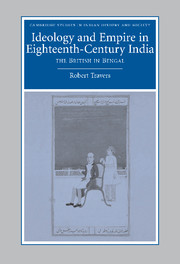Book contents
- Frontmatter
- Contents
- Preface and acknowledgements
- Abbreviations and note on currency
- Glossary of Indian terms
- Map of Bengal and Bihar in the Eighteenth-Century
- Introduction
- 1 Imperium in imperio: the East India Company, the British empire and the revolutions in Bengal, 1757–1772
- 2 Colonial encounters and the crisis in Bengal, 1765–1772
- 3 Warren Hastings and ‘the legal forms of Mogul government’, 1772–1774
- 4 Philip Francis and the ‘country government’
- 5 Sovereignty, custom and natural law: the Calcutta Supreme Court, 1774–1781
- 6 Reconstituting empire, c. 1780–1793
- 7 Epilogue
- Bibliography
- Index
- Cambridge Studies in Indian History and Society
1 - Imperium in imperio: the East India Company, the British empire and the revolutions in Bengal, 1757–1772
Published online by Cambridge University Press: 18 July 2009
- Frontmatter
- Contents
- Preface and acknowledgements
- Abbreviations and note on currency
- Glossary of Indian terms
- Map of Bengal and Bihar in the Eighteenth-Century
- Introduction
- 1 Imperium in imperio: the East India Company, the British empire and the revolutions in Bengal, 1757–1772
- 2 Colonial encounters and the crisis in Bengal, 1765–1772
- 3 Warren Hastings and ‘the legal forms of Mogul government’, 1772–1774
- 4 Philip Francis and the ‘country government’
- 5 Sovereignty, custom and natural law: the Calcutta Supreme Court, 1774–1781
- 6 Reconstituting empire, c. 1780–1793
- 7 Epilogue
- Bibliography
- Index
- Cambridge Studies in Indian History and Society
Summary
The ‘age of revolutions’ arrived early in India, nowhere more so than in Bengal. Contemporary Britons frequently used the term ‘revolutions’ in describing the East India Company's rise to military and political pre-eminence in eastern India, and Indo-Persian sources used a similar term, inqilab. Academic histories of this period of revolutions have been mainly structured around explanations of British ‘expansion’ or imperialism. They have tended to focus on key moments of war and conquest in the 1750s and 1760s as the Company subjugated the faltering regime of the Bengal nawabs. In analysing these events, historians have weighed the role of different causal factors: the expansion of European commerce and Anglo-French wars in south India; Mughal decline and instability within Indian regional states; the corrosive effects of British ‘private trade’ on Indian polities; or the inexorable momentum of militarization. By contrast, this chapter seeks to understand the shifting institutional and ideological settings in which contemporary Britons themselves interpreted the various revolutions in Bengal. The aim here, and in chapter 2, is to probe the links between processes of conquest and colonial state-formation, and to show how narratives of conquest fed into ideologies of rule.
Two points in particular are emphasized in this analysis. First, while historians have generally privileged material incentives for the Company's territorial expansion, especially expanded access to the markets of Bengal, and new revenues from territorial revenues, it is important to see how these material interests were embedded in particular institutional and ideological contexts.
- Type
- Chapter
- Information
- Ideology and Empire in Eighteenth-Century IndiaThe British in Bengal, pp. 31 - 66Publisher: Cambridge University PressPrint publication year: 2007

